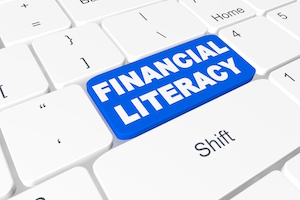 As the pandemic has extended beyond a health crisis into an economic crisis, new survey results shed light on how financially vulnerable many Americans are.
As the pandemic has extended beyond a health crisis into an economic crisis, new survey results shed light on how financially vulnerable many Americans are.
According to a new Charles Schwab Financial Literacy survey, half of all Americans say they would experience financial hardship if they had to cover an emergency expense of $1,000 or less in the next 30 days.
And if they could do things differently, survey respondents indicated they wish they had better money management skills. When asked what they would teach their younger selves about personal finance based on what they know today, the top responses among survey respondents were the value of saving money (59%), basic money management (52%) and how to set financial goals and work toward them (51%).
The impact of financial illiteracy is not lost on the public, the findings suggest. In fact, 89% of respondents agree that lack of financial education contributes to some of the biggest social issues our country faces, including poverty (58%), lack of job opportunities (53%), unemployment (53%) and wealth inequality (52%).
“Financial illiteracy is insidious. The antidote is financial education, which gives people the skills they need to make smart money decision and can help improve their lives,” notes Carrie Schwab-Pomerantz, President of Charles Schwab Foundation. “The pandemic has underscored just how critical basic personal finance skills are in preparing for the unexpected. Financial literacy is a survival skill that everyone needs.”
Nearly two-thirds (63%) of U.S. adults chose financial education as the most important supplementary graduation requirement to math, English and science, compared to 43% who chose health and wellness education, the survey found. Moreover, on a scale of 1-100, Americans rated money management (62.9) as the most important skill for kids to learn, surpassing the dangers of drugs and alcohol (60.5), healthy eating and exercise habits (58.3), and safe driving practices (57).
Visit our Coronavirus resource center!
“History shows that every time our country faces a crisis—whether it’s COVID-19, Hurricane Katrina, or 9/11—the need for greater financial literacy becomes more apparent,” observes Schwab-Pomerantz. “We are in a really uncertain time period when a lot of Americans are faced with difficult financial decisions that will have immediate and long-term effects on their lives.”
To help individuals and families shore up their finances during this period of uncertainty, Schwab-Pomerantz recommends taking five key steps:
- Start an emergency fund. Try to aim for $1,000-$2,000 to get started, but set aside whatever you can and then work your way up to cover three to six months of essential expenses over time, she suggests.
- Create a budget to help prioritize and assess financial resources. Schwab-Pomerantz observes that self-isolation has led to different spending patterns for many people, including cutting back on what some may have previously thought of as “essential.”
- Create a financial plan. Consider it a roadmap to reach financial goals, whether that’s to pay off debt, build savings, or make a large purchase, she explains.
- Ask for help if you’re struggling. Given the scale of this economic crisis, the government, lenders and creditors are trying to work with borrowers through this difficult time. Don’t hide from creditors— that can make things worse, Schwab-Pomerantz advises.
- Focus on what you can control. You can’t predict or control the market, but you can control how you manage your investments, your savings rate, having a financial plan and how you react to events, she emphasizes.
The online survey of 2,046 U.S. adults ages 18 and older was conducted by The Harris Poll on behalf of Charles Schwab from June 4-8, 2020.

